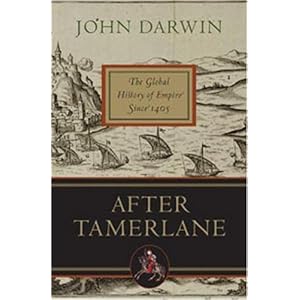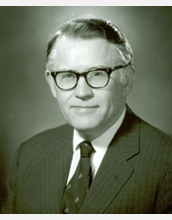
I have been reading
After Tamerlane: The Global History of Empire Since 1405 by John Darwin. It occurred to me to think about the economics of trade in that context.
It seems rather clear that economic productivity must increase from that of hunter gatherer societies to allow much trade to take place. I suspect that a significant turning point takes place when primary producers produce enough, and social stratification takes place with some people appropriating the surplus of others. These then have the resources with which to engage in trade for high-value luxury goods.
Generally however, increased productivity provides more to trade. Increased productivity of course depends importantly on changes in technology and changes in productive institutions.
The theory of comparative advantage indicates that there will be a potential economic advantage to trade, allowing communities to produce those things for which they have a comparative advantage and to trade for those things for which others have a comparative advantage.
Trade is only profitable if the transaction costs are less than the benefits of the exchange.
The transaction costs include such things as costs of transportation, costs due to loss of goods during transportation, and tariffs. In the bad old days, when you transported goods over a distance you had a fairly high probability of someone stealing them.
Of course, part of the transaction costs were the profits taken by intermediaries who carry out a useful function for which they expect to be paid.
Clearly there are technological solutions to reducing transaction costs, such as the construction of roads and canals, improved ships, improved port facilities, improved vehicles, improved power sources, and improved communications technology.
There are also institutional solutions to reducing transaction costs. Thus institutionalizing government services such as road construction and maintenance or the construction and maintenance of postal services are important. So too is institutionalizing banking services so that financial transactions are simpler and less risky.
If one thinks historically, the role of Islam and Islamic states in producing a vast area over which people and goods could pass in relative safety is perhaps comparable to the role of Rome in producing a vast road system and the Pax Romana.
Perhaps even more fundamental is the institutionalization of markets that allow trade to take place. Think of the continent spanning trade systems of the pre-colonial Australian aborigines of Australia or native Americans; how long did it take and how much effort was involved to build the networks that allowed trade in stone axes in Australis or in feathers and turquoise in America. The more elaborate trade networks of empires clearly developed over long periods due to large investments of time and effort.
Of course, technological changes can also allow institutions to span larger geographic areas. The communications improvements of the ancient Persian and Inca empires surely had a role in allowing them to span such large distances. Tamerlane's horsemen could extend state power over a huge area, larger than the infantry based military of earlier empires.
In the 19th and early 20th century, European powers established institutions of colonialism that reduced transaction costs for trade within their colonial empires. In the late 20th century, the United Nations system including the World Trade Organization were representative of new institutions that replace the intra-empire trade institutions with more global free trade institutions. These have been called the two epochs of globalization, but their patterns were somewhat different as well as the volumes of trade.
It would be interesting to see a visual presentation of the growth and decline of trade patterns over historical time, and how they correspond to the growth of states and empires.
I suspect that the economic advantages to trade with lower transaction costs -- some of which can be appropriated to finance the institutions supplying those advantages -- help to explain the growth of empires. Indeed, I suspect that the improved technologies for trade help to explain the changing scales of states and empires.
Of course, the Roman empire declined and led to the Dark Ages, and the World Wars and Great Depression put an end to the colonial empires. Just because an institution provides economic advantages for trade does not imply that mankind is smart enough to maintain and improve those institutions.
 The April 17 to 23, 2010 edition of The Economist has a special report on innovation in emerging markets. It makes the point strongly that firms that are battling for these new, different and rapidly growing markets are innovating both in products and organization in order to survive and thrive. Of course, some of the innovations intended for these new markets will prove to be competitive in existing markets (as happened in the past when innovations intended for the developing markets in the United States proved to be competitive in Europe).
The April 17 to 23, 2010 edition of The Economist has a special report on innovation in emerging markets. It makes the point strongly that firms that are battling for these new, different and rapidly growing markets are innovating both in products and organization in order to survive and thrive. Of course, some of the innovations intended for these new markets will prove to be competitive in existing markets (as happened in the past when innovations intended for the developing markets in the United States proved to be competitive in Europe).
















